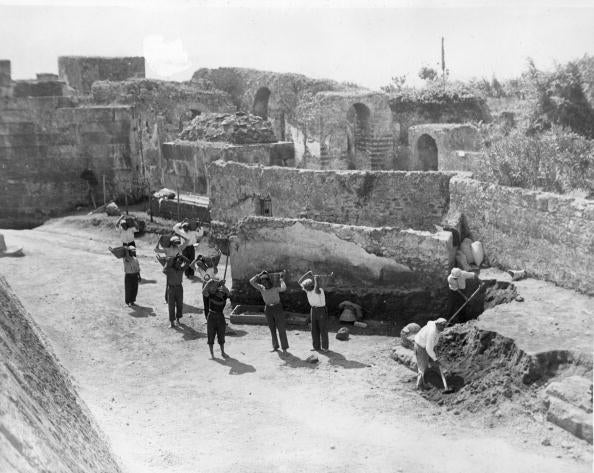Corporate jollies to oust 'cultural fuddy-duddies' from Pompeii ruins

Your support helps us to tell the story
From reproductive rights to climate change to Big Tech, The Independent is on the ground when the story is developing. Whether it's investigating the financials of Elon Musk's pro-Trump PAC or producing our latest documentary, 'The A Word', which shines a light on the American women fighting for reproductive rights, we know how important it is to parse out the facts from the messaging.
At such a critical moment in US history, we need reporters on the ground. Your donation allows us to keep sending journalists to speak to both sides of the story.
The Independent is trusted by Americans across the entire political spectrum. And unlike many other quality news outlets, we choose not to lock Americans out of our reporting and analysis with paywalls. We believe quality journalism should be available to everyone, paid for by those who can afford it.
Your support makes all the difference.It is perhaps the most remarkable archaeological site in the world and more than 3 million visitors stampede through it every year. But if the new tourism councillor for Campania has his way, the numbers visiting Pompeii will be drastically cut, and the site will be thrown open to multinationals for private events to rake in the money needed to maintain the ruins.
"If we cap the number of visitors it will be easier to allow businessmen within the ruins to make money and hold events without being hampered by cultural fuddy-duddies," Claudio Velardi told a press briefing.
"By controlling the number of visitors we could first make the Pompeii experience better for everyone. But we could also increase revenue by offering an opportunity to firms like Google or Microsoft to use the site for a private event."
He said he had already spoken to the computer giants about renting the site, and planned to talk to Pixar and Warner Bros about leasing the ruins as movie sets. "There's nothing scandalous about that," he insisted. "They do it at the Museo del Prado and the Louvre and Fendi even rented the Great Wall of China for a fashion show, paying an outrageous sum to the government in Beijing.
"But here they ostracise you for even thinking such a thing. To the absurd extent that Roman Polanski has had to make his film about Pompeii in Spain."
Mr Velardi is a powerful political fixer from Rome and former right-hand man of the former prime minister Massimo D'Alema, but his vision of Pompeii's future was dismissed out of hand by experts. Piero Guzzo, the archaeological superintendent for Pompeii and Herculaneum, the man with responsibility for what happens on the ground, responded stonily: "I have not yet had a talk with the new councillor. I hope to meet him as soon as possible so we can discuss all issues of common interest." But he pointed out off the record that private money had by no means been shut out of the site. The Packard Humanities Institute, for example, has donated €1.5m (£1.17m) towards upgrading Pompeii and Herculaneum, and Italian firms have donated large sums to restoration work.
Another expert on the sites commented: "Pompeii is already extensively used by film crews; it would be hard for them to be more involved. The superintendent has a clear policy: he allows producers to make documentaries but refuses requests that involve building sets showing the city as it was before the volcanic eruption. That's why Polanski had to go to Spain, to build the city from scratch."
Pompeii's hordes of tourists have the run of the inundated city with minimal controls, and the idea of limiting numbers seems to have been inspired by a similar proposal for Venice, cutting down on day-trippers there by imposing an entrance charge. But one archaeologist was sceptical about the plan. "The only way to cut the numbers would be to raise ticket prices, which at present are absurdly low at €15," he said.
The best way to improve conditions on the sites, according to Andrew Wallace-Hadrill, director of the Herculaneum Conservation Project, is not to limit numbers but manage them better. "You need more custodians on site, ideally at every house people go into. You wouldn't dream of an art gallery without attendants in every room. To have them in every house in Pompeii would not be feasible, but you need more to stop people doing damage. Tourists behave better if they are better educated, for example if they are told what makes the site fragile."
But Wallace-Hadrill feels the situation may improve. "For the first time one man will be responsible for Pompeii and all the other sites in the Bay of Naples, including Herculaneum and the National Archaeological Museum, where most of the treasures from the two sites are collected. The museum only gets a fraction of Pompeii's visitors, even though it is wonderful. The hope is that you can reunite the sites with the objects."
Join our commenting forum
Join thought-provoking conversations, follow other Independent readers and see their replies
Comments